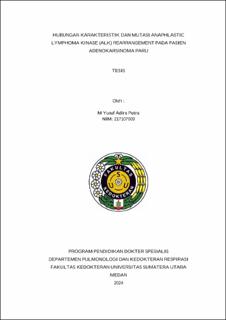Hubungan Karakteristik dan Mutasi Anaphlastic Lymphoma Kinase (ALK) Rearrangement pada Pasien Adenokarsinoma Paru
Anaplastic Lymphoma Kinase (ALK) Rearrangement Prevalence in Histopathology Specimens of Lung Adenocarcinoma Patients

Date
2024Author
Putra, M Yusuf Adira
Advisor(s)
Soeroso, Noni Novisari
Afiani, Dina
Metadata
Show full item recordAbstract
Background : Lung cancer is a malignancy or tumor originating from the lung parenchyma or in the bronchi. Globally, cases and deaths of lung cancer continue to increase. Lung cancer is the most frequently diagnosed cancer for decades. Lung cancer remains the most common cancer diagnosis in male with an estimated 1.37 million diagnosed in 2018. Recent research, with molecular targeted therapy directed at oncogene driver mutations, such as ALK, EGFR, ROS1, RET1, NTRK1, KRAS improve the prognosis of patients with NSCLC.
Methods: This research is a descriptive study, the patient data used is secondary data through medical records. Analysis of ALK fusion protein expression in adenocarcinoma type lung cancer will be carried out in the laboratory to determine the prevalence of ALK rearrangement.
Results: This study revealed the characteristics of lung cancer patients, with the Adenocarcinoma type in this study found that the majority were aged > 60 years as many as 18 patients (52.9%), male as many as 26 patients (76.4%), and were heavy smokers as many as 24 patients (70.6%). Based on the pTNM stage, the majority of patients with lung adenocarcinoma who were the sample in this study were at Stage IVA, namely 24 cases (70.6%) with the most metastases being to the pleura. ALK mutations obtained by immunohistochemic examination in patients with lung cancer with the type of Adenocarcinoma were 2 cases with a percentage of 5.8%.
Conclusion : ALK mutations in lung adenocarcinoma without prior screening are relatively small, so screening which patient is needed the test so ALK can be an examination of choice in order to get the precise therapy.
Collections
- Master Theses [206]
